PHANÓMENON AND PHANTASÍA IN THE SKEPTICISM OF SEXTUS EMPIRICUS
DOI:
https://doi.org/10.26512/pl.v9i17.26886Keywords:
Pyrrhonism. Phainómenon. Phantasía. Sextus Empiricus.Abstract
The skeptic is not only someone who motivates the suspension of judgment [epokhé], but also someone that accepts what is apparent [phainómenon] and makes it their criterion for action. In this sense, the concept of phainómenon is also central in ancient Pyrrhonism; its definition, however, is closely linked to the idea of appearance [phantasía], and this could cause confusion between the terms. The phantasía or the appearence of something refers to a subjective event, something that occurs in the person’s mind; the phainómenon or the very thing that appears is an objective event and is independent of any subject. Therefore, it is necessary to delimitate in a precise way the lines of each one of these concepts inside Pyrrhonian skepticism. This article intends mainly to throw some light on these two concepts, phainómenon and phantasía, and to try to make a clarification in regards to their distinctions and resemblances. For this purpose, we will take as the main reference the book Outlines of skepticism of Sextus Empíricus.
Downloads
References
ANNAS, Julia; BARNES, Jonathan. The modes of scepticism. Cambridge: Cambridge University Press, 1985.
BETT, Richard. Scepticism and ethics. In: BETT, R. (Ed.) The Cambridge companion to ancient scepticism. Cambridge: Cambridge University Press, 2010. p. 181-194.
BOLZANI FILHO, Roberto. Acadêmicos versus pirrônicos. Sképsis, São Paulo, n. 7, 2011. p. 5-55.
BOLZANI FILHO, Roberto. O ceticismo pirrônico na obra de Sexto Empírico. 76f. Dissertação de mestrado, USP, 1992.
BROCHARD, Victor. Os céticos gregos. Trad. Jaimir Conte. São Paulo: Odysseus, 2008.
BURNYEAT, Myles F. Pode o cético viver seu ceticismo? Trad. Rodrigo Pinto de Brito. Sképsis, São Paulo, n. 5, 2010, p. 201-239.
FREDE, Michael. As crenças do cético. Sképsis, São Paulo, n. 3, 2008, p. 139-168.
GAZZINELLI, Gabriela. A vida cética de Pirro. São Paulo: Edições Loyola, 2009.
HUME, David. Investigações sobre o entendimento humano. Trad. José Oscar de Almeida Marques. São Paulo: Editora Unesp, 1999.
LANDESMAN, Charles. Ceticismo. Trad. Cecília Bartalloti. São Paulo: Loyola, 2002.
LEE, Mi-Kyoung. Antecedents in early Greek philosophy. In: BETT, R. (Ed.) The Cambridge companion to ancient scepticism. Cambridge: Cambridge University Press, 2010. P. 13-35.
PATRICK, Mary Mills. Sexto Empírico e o ceticismo grego. Trad. Jaimir Conte. Florianópolis, 2010.
PERIN, Casey. Scepticism and belief. In: BETT, R. (Ed.) The Cambridge companion to ancient scepticism. Cambridge: Cambridge University Press, 2010. p. 145-164.
PERIN, Casey. The demand of reason: an essay on Pyrrhonian scepticism. Oxford: Oxford University Press, 2010.
PLATÃO. Teeteto. Trad. Carlos Alberto Nunes. Belém: Editora Universitária UFPA, 2001.
PORCHAT PEREIRA, Oswaldo. A noção de phainómenon em Sexto Empírico. Analytica, Rio de Janeiro, v. 17, n. 2, 2013, p. 291-323.
PORCHAT PEREIRA, Oswaldo. Sobre o que aparece. In: Rumo ao ceticismo. São Paulo: Editora Unesp, 2006. p. 117-145.
SEXTUS Empiricus. Against the logicians. Trad. R. G. Bury. Harvard: The Loeb Classical Library, v. II, 2006.
SEXTUS Empiricus. Against the phycisists and Against the ethicists. Trad. R. G. Bury. Harvard: The Loeb Classical Library, v. III, 2006.
SEXTUS Empiricus. Against the professors. Trad. R. G. Bury. Harvard: The Loeb Classical Library, v. IV, 2006.
SEXTUS Empiricus. Outlines of skepticism. Ed. revista. Trad. Julia Annas e Jonathan Barnes. Cambridge: Cambridge University Press, 2000.
VOGT, M. Katja. Scepticism and action. In: BETT, R. (Ed.) The Cambridge companion to ancient scepticism. Cambridge: Cambridge University Press, 2010. p. 165-180.
Downloads
Published
Issue
Section
License
Copyright (c) 2020 PÓLEMOS ”“ Revista de Estudantes de Filosofia da Universidade de Brasília

This work is licensed under a Creative Commons Attribution-NonCommercial-NoDerivatives 4.0 International License.
Todos os trabalhos que forem aceitos para publicação, após o devido processo avaliativo, serão publicados sob uma licença Creative Commons, na modalidade Attribution-NonCommercial-NoDerivatives 4.0 International Public License (CC BY-NC-ND 4.0). Esta licença permite que qualquer pessoa copie e distribua a obra total e derivadas criadas a partir dela, desde que seja dado crédito (atribuição) ao autor / Ã autora / aos autores / às autoras.


